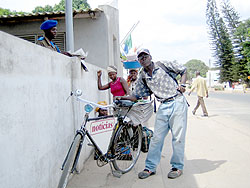1 February 2005
MediaNews 16 - February 2005
How the Mozambican media performed during election time
Reflections
By Barbara Bosma
During the electoral process in Mozambique, media gave more attention to the ruling and winning party Frelimo than to other political parties. Further, journalists reported on the organisational aspects of the elections, rather than on party programmes. Five journalists reflect on the performance of the media throughout the presidential and legislative elections.  | | Streetvendor in Nampula, selling the newspaper Noticias - (c) Elma Doeleman |
"I have nothing but praise for the way in which my colleagues on Radio Moçambique and Mozambican Television (TVM) got the results from the polling stations on the air only a few hours after the close of polls. Thanks to them Mozambique knew that Frelimo and Guebuza had a massive victory. The National Elections Commission (CNE) did not publish its official results until weeks later.
Indeed, media reported a lot on so-called ‘technical organisation’ of the elections to the detriment of the programmes of the political parties. I personally think party programmes are meaningless. They avoid all the hard questions. But there is another explanation. Access for observers, timely distribution of election materials and state of the registers, are crucial for the proper running of the elections. They are important to ensure that the will of the voters can be known and respected."
Paul Fauvet, head of the English desk of Mozambique News Agency (AIM).
Lack of debate
"The level of development of a society can be measured by the quality of its debate. Debate in Mozambique is poor. But you cannot blame this to the media. The media just represents debate, they don’t produce it. There is a lack of debate because of Mozambique’s pernicious dependence on aid. When your options are limited there is no point debating whatever you might think is right. Political legitimacy in Mozambique is not conferred by the electorate, but by the donors."
Elísio Macamo, sociologist and journalist for magazine Mais.
Improved quality of coverage
"Compared to the previous elections the media improved the quality of coverage, in terms of trying to be balanced, critical and independent. But it is still difficult to make an objective and abstract analysis in public without being immediately linked to one or the other side. This shows media and society are not so plural as we would like to see, in terms of really having different opinions. There is a clear need to stimulate real debate and investigation, to bring more diversity, be analytic and to build capacity among journalists."
Mateus Chale, correspondent for Reuters in Mozambique.
Not easy to be independent
"Normally it is visible which media outlet is biased to which political party, but in a moderate way. During the elections however this phenomenon was amplified a lot. Even if newspaper Notiçias provided space to opposition party Renamo, it was the direct transmission of what was said by the National Elections Commission.
It is not easy to be an independent journalist in Mozambique. During other elections the leader of Renamo used to be dissatisfied about the biased reports of TVM. This time he was content with the coverage of the TVM journalist, who was reporting as much of Renamo’s electoral campaign as possible. But when the journalist returned he was considered a Renamo partisan. In Mozambique people believe that , if you are critical against Frelimo, you favour Renamo."
Jordane Bertrand, correspondent in Mozambique for Le Monde, Radio France Internationale (RFI).
Depending on official sources
"Media organisations depend mostly on official sources of information like press conferences and interviews with the contestants. They don’t tend to visit party rallies were they could listen to the messages delivered and point out strengths and weaknesses. One of the reasons is the scarcity of means to move around. Many journalists are forced to hitchhike. Another reason is the lack of information provided by most political parties, who did not even send their party programmes to journalists."
Manuel Mucari of MISA-Mozambique. This organisation provided tools for a balanced coverage of the electoral process across the country by organising
workshops across the country for 120 journalists. It also monitored media coverage of the elections. This report will be published shortly.
Information about monitoring Mozambican media by the European Union
Information about monitoring Mozambican elections by Jimmy Carter
MISA-Mozambique Barbara Bosma is a freelance journalist.
barbarabosma@hotmail.com
|

